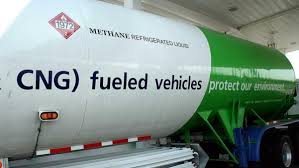
Opening up the potential to significantly expand energy production in a region that’s currently a big importer, a joint expedition by India and the U.S. discovered a major deposit of natural gas in the Indian Ocean.
The U.S. Geological Survey said in a statement that this was potentially the first producible reserve of its kind in the Indian Ocean as a large, highly enriched deposit of natural gas hydrate -- an icy form of the fuel -- in the Bay of Bengal off the country’s east coast was discovered by India’s Ministry of Petroleum and Natural Gas and the U.S. agency.
The world’s expanding supply of gas could find some addition due to the finding. The US agency said that it is estimated that the planet’s gas hydrate accumulations “greatly exceed the volume of all known conventional gas resources” referring to the amount of the fuel contained in global gas reserves. In recent years, a coal, which releases twice the heat-trapping emissions as natural gas when burned, is being blamed for global burning, countries like India and China seek to slash their dependence on higher polluting energy sources like coal, the discovery comes amidst such an environment in the global energy scenario.
“Advances like the Bay of Bengal discovery will help unlock the global energy resource potential of gas hydrates as well help define the technology needed to safely produce them,” Walter Guidroz, energy resources program coordinator for the U.S. Geological Survey, said in the statement.
Following an exploration of the region from March to July of last year, the huge discovery was made. While formations in sand reservoirs like the one announced Monday are the most easily tapped with existing technologies, earlier finds of hydrate accumulations were unlikely to be producible. Whether production from the Bay of Bengal site is economic is the next step that has to be determined.
“The results from this expedition mark a critical step forward to understanding the energy resource potential of gas hydrates,” Tim Collett, a senior scientist with the U.S. agency, said in the statement.
This is good news for India which is hungry to secure more of its own supplies and is heavily dependent on imports to meet its oil and gas needs.
"The results from this expedition mark a critical step forward to understanding the energy resource potential of gas hydrates," said USGS Senior Scientist Tim Collett.
Describing the details of the discovery Collett said: "we believe to be several of the largest and most concentrated gas hydrate accumulations yet found in the world," referring to the discovery in the sand reservoirs of the Krishna-Godavari Basin contents.
"Advances like the Bay of Bengal discovery will help unlock the global energy resource potential of gas hydrates as well help define the technology needed to safely produce them," said Walter Guidroz, USGS Energy Resources Program coordinator.
(Source:www.bloomberg.com & www.thetimesofindia.com)
The U.S. Geological Survey said in a statement that this was potentially the first producible reserve of its kind in the Indian Ocean as a large, highly enriched deposit of natural gas hydrate -- an icy form of the fuel -- in the Bay of Bengal off the country’s east coast was discovered by India’s Ministry of Petroleum and Natural Gas and the U.S. agency.
The world’s expanding supply of gas could find some addition due to the finding. The US agency said that it is estimated that the planet’s gas hydrate accumulations “greatly exceed the volume of all known conventional gas resources” referring to the amount of the fuel contained in global gas reserves. In recent years, a coal, which releases twice the heat-trapping emissions as natural gas when burned, is being blamed for global burning, countries like India and China seek to slash their dependence on higher polluting energy sources like coal, the discovery comes amidst such an environment in the global energy scenario.
“Advances like the Bay of Bengal discovery will help unlock the global energy resource potential of gas hydrates as well help define the technology needed to safely produce them,” Walter Guidroz, energy resources program coordinator for the U.S. Geological Survey, said in the statement.
Following an exploration of the region from March to July of last year, the huge discovery was made. While formations in sand reservoirs like the one announced Monday are the most easily tapped with existing technologies, earlier finds of hydrate accumulations were unlikely to be producible. Whether production from the Bay of Bengal site is economic is the next step that has to be determined.
“The results from this expedition mark a critical step forward to understanding the energy resource potential of gas hydrates,” Tim Collett, a senior scientist with the U.S. agency, said in the statement.
This is good news for India which is hungry to secure more of its own supplies and is heavily dependent on imports to meet its oil and gas needs.
"The results from this expedition mark a critical step forward to understanding the energy resource potential of gas hydrates," said USGS Senior Scientist Tim Collett.
Describing the details of the discovery Collett said: "we believe to be several of the largest and most concentrated gas hydrate accumulations yet found in the world," referring to the discovery in the sand reservoirs of the Krishna-Godavari Basin contents.
"Advances like the Bay of Bengal discovery will help unlock the global energy resource potential of gas hydrates as well help define the technology needed to safely produce them," said Walter Guidroz, USGS Energy Resources Program coordinator.
(Source:www.bloomberg.com & www.thetimesofindia.com)





